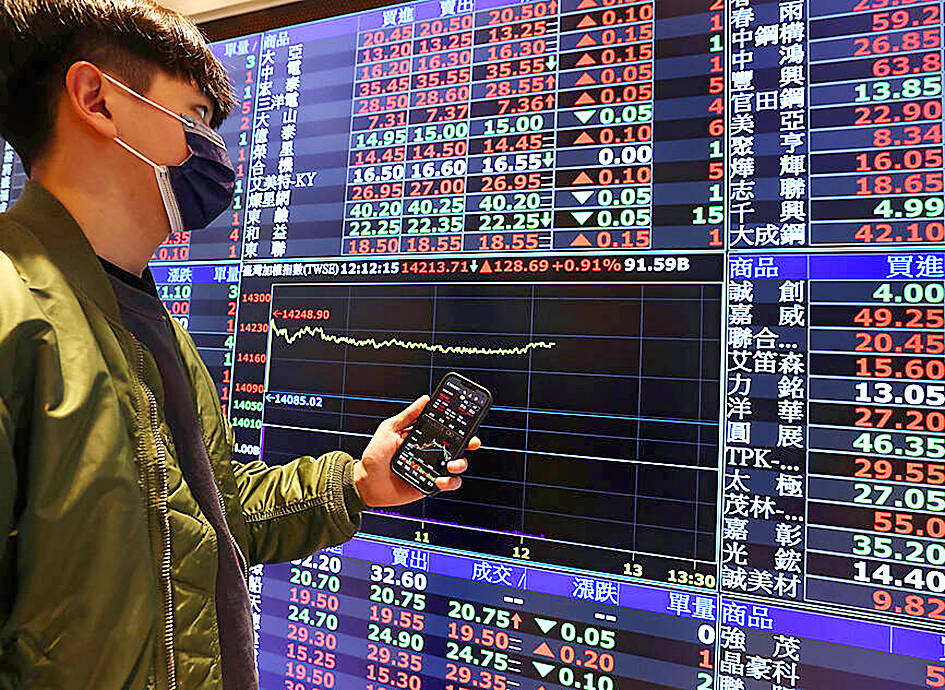The TAIEX yesterday closed up 0.17 percent at 17,370.56, outperforming Hong Kong’s Hang Seng Index for the first time in 30 years, as the local index continued to benefit from liquidity-driven rallies, analysts said.
The TAIEX bucked downturns in most Asian markets with a turnover of NT$321.715 billion (US$10.29 billion), as foreign portfolio managers raised their stakes in Taiwanese tech companies, especially firms involved in the global supply chain of artificial intelligence products, Taiwan Stock Exchange (TWSE) data showed.
By contrast, the Hang Seng Index shed 2.08 percent, or 360.7 points, to close at 16,993.44, its lowest in five weeks, after China’s top food-delivery platform operator Meituan (美團) plunged after warning about a slowdown in demand.

Photo: CNA
Despite Hong Kong’s reputation for having a sound banking system, virtually no public debt, a strong legal system and ample foreign exchange reserves, its status as a regional financial hub has taken a hit from capital outflows amid US-China trade disputes and a slowdown in private consumption, analysts said, adding that property market corrections are weighing heavily on the territory.
Hong Kong on Nov. 10 lowered its economic growth forecast for this year to 3.2 percent, from a range of 4 to 5 percent, a sign that tough times remain amid a muted post-COVID-19-pandemic recovery.
The downward revision came even though the territory’s economy grew 4.1 percent, faster than Taiwan’s 2.32 percent over the same period.
The Directorate-General of Budget, Accounting and Statistics on Tuesday trimmed Taiwan’s GDP growth forecast for this year from 1.61 percent to 1.42 percent, but expects growth to more than double to 3.35 percent next year.
Hong Kong’s government has for months tried to boost turnover and revive a torpid stock market, but to little avail.
Analysts have said that a reversal in fortunes would not be possible without a major improvement in China’s economic prospects.
The TAIEX, on the other hand, climbed to an eight-month high despite a lackluster economy this year, due mainly to its rising importance in the supply of chips and other electronics.
Foreign institutional investors yesterday increased holdings in local shares by a net NT$9.9 billion, offsetting a net sale of NT$787 million by proprietary traders, TWSE data showed.
Mutual funds bought up positions by a modest net NT$74 million, the data showed.
The steep rise in the local currency lent support to hot money inflows fueled by expectations that a technology product downcycle is coming to an end.
The New Taiwan dollar has gained 3.6 percent this month against the US dollar, the central bank said, after the US Federal Reserve left its policy rates unchanged in September and last month.

A Ministry of Foreign Affairs official yesterday said that a delegation that visited China for an APEC meeting did not receive any kind of treatment that downgraded Taiwan’s sovereignty. Department of International Organizations Director-General Jonathan Sun (孫儉元) said that he and a group of ministry officials visited Shenzhen, China, to attend the APEC Informal Senior Officials’ Meeting last month. The trip went “smoothly and safely” for all Taiwanese delegates, as the Chinese side arranged the trip in accordance with long-standing practices, Sun said at the ministry’s weekly briefing. The Taiwanese group did not encounter any political suppression, he said. Sun made the remarks when

PREPAREDNESS: Given the difficulty of importing ammunition during wartime, the Ministry of National Defense said it would prioritize ‘coproduction’ partnerships A newly formed unit of the Marine Corps tasked with land-based security operations has recently replaced its aging, domestically produced rifles with more advanced, US-made M4A1 rifles, a source said yesterday. The unnamed source familiar with the matter said the First Security Battalion of the Marine Corps’ Air Defense and Base Guard Group has replaced its older T65K2 rifles, which have been in service since the late 1980s, with the newly received M4A1s. The source did not say exactly when the upgrade took place or how many M4A1s were issued to the battalion. The confirmation came after Chinese-language media reported

The Taiwanese passport ranked 33rd in a global listing of passports by convenience this month, rising three places from last month’s ranking, but matching its position in January last year. The Henley Passport Index, an international ranking of passports by the number of designations its holder can travel to without a visa, showed that the Taiwan passport enables holders to travel to 139 countries and territories without a visa. Singapore’s passport was ranked the most powerful with visa-free access to 192 destinations out of 227, according to the index published on Tuesday by UK-based migration investment consultancy firm Henley and Partners. Japan’s and

BROAD AGREEMENT: The two are nearing a trade deal to reduce Taiwan’s tariff to 15% and a commitment for TSMC to build five more fabs, a ‘New York Times’ report said Taiwan and the US have reached a broad consensus on a trade deal, the Executive Yuan’s Office of Trade Negotiations said yesterday, after a report said that Washington is set to reduce Taiwan’s tariff rate to 15 percent. The New York Times on Monday reported that the two nations are nearing a trade deal to reduce Taiwan’s tariff rate to 15 percent and commit Taiwan Semiconductor Manufacturing Co (TSMC, 台積電) to building at least five more facilities in the US. “The agreement, which has been under negotiation for months, is being legally scrubbed and could be announced this month,” the paper said,